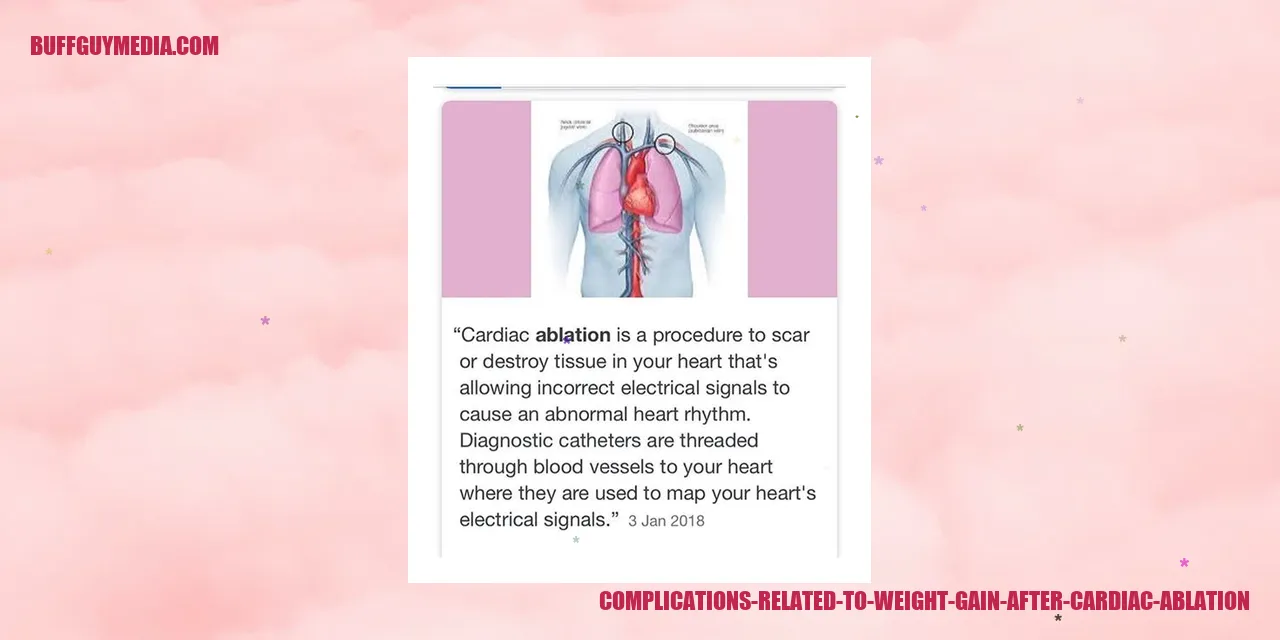Weight Gain after Cardiac Ablation: Causes, Effects, and Management
Understanding weight gain After Cardiac Ablation
The Impact of Hormonal Changes
Cardiac ablation is a commonly performed medical procedure that can help restore normal heart rhythm. However, some individuals may experience weight gain following this treatment. One of the contributing factors to this weight gain is the disruption of hormonal balance in the body.
Hormones are crucial for regulating metabolism and body weight. Cardiac ablation can affect the levels of hormones such as thyroid hormones, insulin, and cortisol, leading to increased appetite and a decrease in metabolic rate, ultimately resulting in weight gain.
The Influence of Medication
In addition to hormonal changes, certain medications prescribed after cardiac ablation can also contribute to weight gain. Some medications, like beta-blockers, can have weight gain as a side effect. These medications work by slowing down the heart rate, but they can also affect metabolism and increase the body’s tendency to store fat, leading to weight gain.
It is important to note that not everyone who undergoes cardiac ablation will experience weight gain due to medication. The impact may vary depending on factors such as age, overall health, and lifestyle choices.
The effects of Reduced Physical Activity
During the recovery period after cardiac ablation, individuals are often advised to limit physical activity. Unfortunately, this decreased physical activity can contribute to weight gain. Regular exercise plays a significant role in maintaining a healthy weight by burning calories and stimulating metabolism.
It is essential for those who have undergone cardiac ablation to work closely with their healthcare providers to gradually resume physical activity once it is deemed safe. Incorporating low-impact exercises and gradually increasing intensity can help minimize weight gain associated with reduced physical activity.
The Association with Fluid Retention
Fluid retention, also known as edema, is another contributing factor to weight gain after cardiac ablation. This condition is often observed in patients who experience a buildup of fluid in their legs, ankles, or abdomen. The body retains excess fluid in response to inflammation or changes in blood flow.
Individuals experiencing fluid retention after cardiac ablation should monitor their salt intake and follow the recommendations of their healthcare providers regarding fluid restriction. Managing fluid retention can help prevent unnecessary weight gain and improve overall comfort and well-being.
In conclusion, weight gain after cardiac ablation can be influenced by various factors, including hormonal changes, medication side effects, reduced physical activity, and fluid retention. It is important for individuals undergoing this procedure to be aware of these potential risks and consult their healthcare providers for personalized guidance on managing their weight and overall health.]
[[READMORE]]

Effectively Managing Weight Gain After Cardiac Ablation
Achieving a Balanced Diet and Controlling Portions
Properly managing weight gain after cardiac ablation requires maintaining a well-balanced diet and practicing portion control. It is crucial to consume a variety of nutrient-rich foods including fruits, vegetables, whole grains, and lean proteins. These choices provide essential nutrients while supporting overall heart health. Additionally, being mindful of portion sizes is important to avoid overeating. By avoiding processed and high-sodium foods, you can regulate fluid retention and promote effective weight management.
Also read:
Costco Healthy Noodles Recipes: Delicious and Nutritious
Intermittent Fasting Weight Loss Calculator | A Scientific Approach
Maintaining a Regular Exercise Routine
Regular physical activity plays a vital role in achieving and maintaining a healthy weight post cardiac ablation. Engaging in consistent exercise helps to burn calories, improve cardiovascular health, and facilitate weight loss. It is advisable to consult with your healthcare professional to design an exercise regimen tailored to your individual needs and capabilities. Incorporating activities like walking, swimming, or cycling into your routine can greatly benefit weight management and enhance your overall well-being.
Keeping a Close Eye on Fluid Intake
Monitoring your fluid intake is crucial in effectively managing weight gain after cardiac ablation. Striking a balance between adequate hydration and avoiding excessive fluid retention is key. It is advisable to consult with your healthcare professional to determine the appropriate daily fluid intake based on your specific health requirements. Limiting the consumption of caffeinated or sugary beverages and opting for water or herbal teas can greatly contribute to weight management and maintain optimal heart health.
Seeking Professional Guidance
Consulting with a healthcare professional is essential when managing weight gain after cardiac ablation. They can provide personalized recommendations based on your individual health condition and medical history. Healthcare professionals can assist in establishing realistic weight loss goals, creating a customized dietary plan, and prescribing appropriate exercise routines. Regular check-ups will enable monitoring of your progress and allow for necessary adjustments to your weight management plan to ensure ongoing success.

The Consequences of Weight Gain following Cardiac Ablation
Elevated Possibility of Cardiovascular Complications
Weight gain subsequent to cardiac ablation can have considerable ramifications on cardiovascular well-being. Research indicates that individuals who experience weight gain after the procedure may face an augmented risk of developing cardiovascular issues, including elevated blood pressure, heart disease, and stroke. The surplus weight places additional strain on the heart, increasing the likelihood of experiencing these complications.
Impacts on Overall Quality of Life
Weight gain can significantly impact the overall quality of life for patients who have undergone cardiac ablation. The physical and emotional burden of carrying extra weight can result in decreased mobility, reduced energy levels, and diminished self-confidence. This can hamper individuals’ ability to perform daily activities, engage in enjoyable hobbies, and maintain social connections, ultimately impairing their quality of life.
Potential Adverse effects on Heart Function
Weight gain following cardiac ablation can negatively affect heart function. The extra weight places added strain on the heart muscle, forcing it to work harder to pump blood efficiently. This increased workload can lead to reduced heart function, potentially causing symptoms such as breathlessness, fatigue, and decreased exercise tolerance. Addressing weight gain promptly is crucial to prevent further deterioration of heart function.
Possible Requirement for Additional Treatment
Weight gain subsequent to cardiac ablation may necessitate supplementary treatment measures. If weight gain persists or becomes excessive, healthcare professionals might recommend lifestyle modifications, including dietary adjustments and increased physical activity, to manage and reduce weight. In some instances, weight management programs or consultations with nutritionists may be necessary to assist patients in achieving healthy weight goals. Taking prompt and proactive measures is vital to prevent further complications and maintain long-term cardiovascular health.

Understanding the Psychological Impact of Weight Gain Following Cardiac Ablation
Dealing with Emotional Challenges and Body Image Concerns
Weight gain post-cardiac ablation can pose significant emotional challenges for individuals. It often affects body image, resulting in feelings of dissatisfaction, insecurity, and diminished self-esteem. The physical changes experienced by patients can be distressing, as they may struggle to recognize themselves in their altered bodies. These emotional challenges can have a negative impact on mental well-being, influencing overall quality of life.
Addressing Depression and Anxiety in Relation to Weight Gain
Weight gain associated with cardiac ablation can contribute to the onset or exacerbation of depression and anxiety. The transformations in appearance can trigger emotions like sadness, frustration, and helplessness. Additionally, the fear of further health complications or cardiac issues linked to weight gain can intensify anxiety levels. It is crucial to address these psychological concerns alongside physical recovery to ensure comprehensive patient care.
Developing Coping Mechanisms and Building Support Systems
Efficient coping strategies and a strong support system are vital in managing weight gain post-cardiac ablation. Encouraging patients to adopt healthy coping mechanisms can help them navigate their emotions and maintain good mental well-being. These strategies may include seeking professional counseling, joining support groups, practicing stress-reduction techniques such as mindfulness or meditation, and engaging in activities that promote self-care and self-acceptance.
Recognizing the Importance of Mental Well-being
The psychological impact of weight gain following cardiac ablation should not be disregarded. Mental well-being plays a pivotal role in the overall recovery process and long-term health outcomes. Healthcare providers and caregivers should offer adequate support, information, and resources to help patients cope with the emotional challenges associated with weight gain. Integrating mental health assessments and interventions into post-ablation care can contribute to better psychological adjustment and ultimately improve the patients’ quality of life.

Preventing Weight Gain Following Cardiac Ablation
Lifestyle Changes Prior to the Procedure
Cardiac ablation, a medical procedure used to treat irregular heart rhythms, requires careful consideration of lifestyle modifications to prevent weight gain. While the focus is primarily on the heart, taking proactive steps to maintain a healthy body weight is essential.
Prior to undergoing cardiac ablation, it is crucial to adopt a well-balanced diet that includes a variety of fruits, vegetables, whole grains, and lean proteins. Regular exercise, such as brisk walks or moderate-intensity workouts, is also important in preventing excessive weight gain.
Regular Weight Monitoring
Following cardiac ablation, it is imperative to regularly monitor body weight to detect any significant fluctuations. Sudden weight gain can indicate fluid retention or other underlying health issues. By keeping track of weight on a regular basis, potential concerns can be identified early and appropriately addressed.
It’s important to note that some swelling and weight gain may be experienced post-ablation due to changes in body fluid. Nonetheless, practicing healthy habits will help manage weight effectively over time.
Implementing Healthy Practices After Ablation
To prevent weight gain after cardiac ablation and promote overall well-being, implementing healthy practices is crucial. It is advisable to sustain a nutritious diet and engage in regular physical activity. Incorporating cardiovascular exercises, strength training, or exercises recommended by healthcare professionals can aid in maintaining weight control. Avoiding prolonged periods of inactivity is also strongly recommended.
Additionally, practicing stress management techniques like meditation, deep breathing exercises, or engaging in activities that induce relaxation can contribute to maintaining a healthy weight. Stress often triggers emotional eating or unhealthy habits that can contribute to weight gain.
Developing a Tailored Weight Management Plan
To effectively prevent weight gain after cardiac ablation, working alongside healthcare professionals in developing a personalized weight management plan is recommended. This plan will take into account individual factors such as age, medical history, current medications, and lifestyle preferences.
A personalized plan may include setting specific weight management goals, creating a well-balanced meal plan, and establishing an exercise routine tailored to individual capabilities. Regular follow-up appointments with healthcare providers will help track progress and make necessary adjustments to the plan as needed.
By actively participating in a personalized weight management plan, individuals can optimize their overall health and minimize the risk of weight gain following cardiac ablation.

Understanding the Long-term Implications of Weight Gain After Cardiac Ablation
Impact on Cardiac Health and Functionality
Weight gain subsequent to a cardiac ablation procedure, employed to address specific heart rhythm disorders, can significantly impact the long-term health and functioning of the heart. The excess weight places excessive strain on the cardiovascular system, elevating the workload and potentially giving rise to complications like elevated blood pressure, heart failure, and various cardiovascular ailments. This compromised cardiac capacity translates into symptoms like fatigue, breathlessness, and chest discomfort.
Association with Potential Future Complications
Weight gain following cardiac ablation can also be correlated with potential future complications. The accumulation of surplus body fat augments the risk of developing conditions such as diabetes, sleep apnea, and metabolic syndrome. These ailments serve to further deteriorate cardiovascular health, amplifying the likelihood of experiencing heart-related incidents like myocardial infarctions or strokes.
Recognizing the Importance of Ongoing Monitoring and Management
Given the potential detrimental impact of weight gain on the health of the heart, continuous monitoring and effective management remain imperative for patients who have undergone cardiac ablation. Regular check-ups with healthcare professionals, including cardiologists and nutritionists, can aid in tracking weight fluctuations and offer guidance in sustaining a healthy body weight. Embracing lifestyle modifications, such as a well-balanced diet and engaging in regular physical activity, are often recommended for long-term weight management and the protection of cardiovascular well-being.
Potential Requirement for Further Medical Intervention
In instances where weight gain exceeds tolerable limits or poses a significant threat to cardiovascular health, further medical intervention may become necessary. This may encompass additional treatments or procedures targeted at weight control, such as weight loss medications or bariatric surgery. The decision regarding additional intervention should be made in collaboration with healthcare professionals, taking into account the individual’s overall health condition and weighing the potential risks and benefits inherent to the chosen approach.
[ 
Understanding the Connection between Eating Patterns and Weight Changes after Cardiac Ablation
Impact of Increased Calorie Consumption
Following cardiac ablation, individuals should be mindful of their eating patterns as they can influence weight changes. One crucial factor that contributes to weight gain is an elevated calorie intake. It is important to note that cardiac ablation affects the heart's rhythm, reducing its efficiency in burning calories. Consequently, consuming excess calories can lead to weight gain, placing additional strain on the heart.
Prioritizing Nutritious Food Choices
For individuals who have undergone cardiac ablation and want to prevent weight gain, opting for nourishing food choices is paramount. Selecting a well-rounded diet that includes whole grains, lean proteins, fruits, vegetables, and low-fat dairy products can promote heart health and sustain a healthy weight. Foods rich in nutrients offer essential vitamins and minerals while limiting unnecessary calories, minimizing the risk of weight gain.
The Role of Emotional Eating
Emotional eating plays a significant role in weight changes after cardiac ablation. Emotional disturbances following medical procedures can trigger unhealthy eating behaviors, resulting in unwanted weight gain. It is crucial to identify emotional triggers and find alternative coping strategies such as engaging in activities, seeking support, or practicing stress management techniques. Prioritizing emotional well-being alongside a healthy diet is essential, as it directly impacts eating habits.
The Significance of Mindful Eating Habits
Mindful eating involves paying complete attention to the eating experience, savoring flavors, and listening to the body's hunger and fullness cues. Implementing mindful eating practices can aid in managing weight changes after cardiac ablation. By slowing down and being aware of portion sizes, individuals can better control their calorie intake. This practice encourages thoughtful food choices and fosters a healthier relationship with food, ultimately contributing to long-term weight management.
]

Optimal Exercise Programs for Weight Management After Ablation
Burn Calories with Cardiovascular Workouts
To effectively manage weight after ablation, incorporating cardiovascular exercises into your routine is vital. These workouts not only help with calorie burning but also improve cardiovascular health and contribute to overall weight loss. Engaging in activities such as jogging, cycling, swimming, or brisk walking will elevate your heart rate and efficiently burn excess calories.
Maintaining Muscle with Strength Training
After ablation, it is important to focus on strength training exercises to maintain muscle mass and enhance metabolism. Including exercises that target major muscle groups, such as weightlifting, resistance band workouts, or bodyweight exercises, can help preserve muscle mass and support long-term weight management. Make sure to incorporate regular strength training sessions into your exercise routine for optimal results.
Joint-Friendly Options for Exercise
Choosing low-impact exercises is crucial after ablation to protect your joints while staying physically active. Options such as swimming, yoga, using an elliptical machine, or stationary cycling can offer an effective workout without exerting excessive strain on your joints. By opting for these exercises, you can maintain an active lifestyle and manage your weight while minimizing the risk of joint injuries.
Make Physical Activity a Part of Your Daily Routine
An effective strategy for weight management after ablation involves incorporating physical activity into your daily routine. Opt for taking the stairs instead of the elevator, walking or biking to work, or engaging in activities like gardening or dancing. These small lifestyle modifications can have a significant impact on your overall fitness level and weight management goals.

Frequently Inquired Queries concerning Excessive Weight Gain Post Cardiac Ablation
What is the usual weight gain amount after ablation?
The extent of weight gain following cardiac ablation varies among individuals. Some may notice a minor weight gain, while others may experience a more noticeable increase. Typically, a weight gain ranging from 2-5 pounds is considered normal within the initial weeks after the ablation procedure.
Can weight gain be prevented after cardiac ablation?
Although it may not be entirely avoidable, there are ways to manage and minimize weight gain after undergoing cardiac ablation. Adopting a healthy, balanced diet, engaging in regular physical activity, and discussing any concerns or specific recommendations with your healthcare provider are essential steps.
How long does it take to lose post-ablation weight gain?
The time it takes to shed the weight gained post ablation can vary. Some individuals may witness a reduction in weight within a few weeks, while others may require a longer duration. It is crucial to understand that achieving sustainable weight loss is a gradual process, and collaborating closely with healthcare professionals can help you develop a sensible plan to achieve your goals.
What dietary modifications can assist in managing weight gain?
Making wise dietary choices plays a significant role in managing weight gain after cardiac ablation. This entails prioritizing a well-rounded diet that includes abundant fruits, vegetables, whole grains, and lean proteins. Additionally, limiting the intake of processed foods, sugary beverages, and high-fat snacks is essential. Practicing portion control can also support weight management objectives.
Is it common to observe weight fluctuations after ablation?
Yes, it is typical to experience weight fluctuations following cardiac ablation. Factors like fluid retention, alterations in medication, and fluctuations in sodium levels can contribute to these variations in weight. However, if you notice significant or prolonged weight fluctuations, it is recommended to consult with your healthcare provider to rule out any underlying issues.
What exercises are deemed safe post cardiac ablation?
Engaging in regular physical activity is generally encouraged after undergoing cardiac ablation to promote overall cardiovascular health. The specific exercises that are deemed safe for individuals may vary based on factors such as their overall health, recovery progress, and presence of any other cardiac conditions. It is crucial to consult with your healthcare provider prior to initiating any exercise regimen following the ablation procedure, as they can provide personalized recommendations.
When should medical assistance be sought for post-ablation weight gain?
If you experience significant and unexplained weight gain or if your weight gain is accompanied by symptoms such as breathing difficulties, swelling, or chest discomfort, it is important to seek medical assistance immediately. These symptoms could indicate underlying issues that require prompt medical attention.









